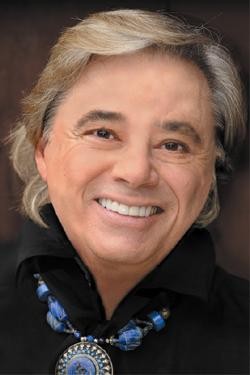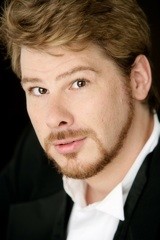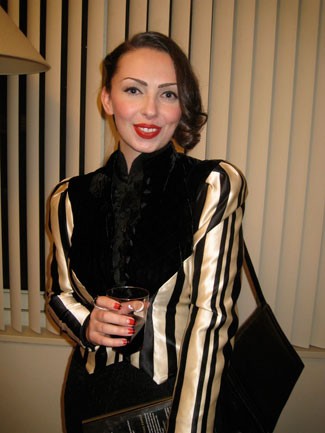Thomas Pasatieri's World Premier at DiCapo Opera
Catherine Malfitano Sings On
By: Susan Hall - Nov 10, 2012
The Martyrs
by Thomas Pasatieri
Libretto by Daphne Malfitano
Zeffin Quinn Hollis (Percy), Catherine Malfitano (Marianne)
Daphne Malfitano, Director
Pacien Mazzagatti, Music Director
Anna Demenkoff (Production Stage Manager), Jeffrey Walker (Technical Director), Susan Roth (Lighting Designer), Assistant Lighting Director (Sarah Riffle), Rebecca Greenstein (Hair and Makeup)
DiCapo Opera Theatre
New York, New York
World Premier
November 8, 10, 11, 15, 16, 18 2012
For intimate opera, where intense human stories are woven on small scale, the DiCapo Opera offers a perfect setting. DiCapo dares to think big thoughts on a wide stage tantalizingly close to its 204 velvet burgundy seats. From them the audience can easily enter the opera world presented on stage.
Opera worlds are often uneasy and certainly Thomas Pasatieri's new opera, comprised of two monodramas, is. The Martyrs has a wrenching yet beautiful score. A searing text was written by Daphne Malfitano.
Pasatieri says that he was born to write dramatic and vocal music. He naturally composes to sometimes compress, sometimes distend the vocal line. Not only are dynamic shifts always emotionally appropriate, but abrupt shifts and reversals constantly jolt and capture attention.
Lyrical lines may be flowing. Certainly they sit well in the voice. But in the two characters that inhabit The Martyrs, ragged edges and precipitous slides are everywhere in the musical lines joined by words. Declaratory statements where the sung line comes close to speech stand out not only because they are rare and apt, but also because the words are in distended staccato. Different. Shocking. Pasatieri delivers excitement in a score as various as the emotional states of Percy and Marianne.
Perhaps because the great soprano Catherine Malfitano and ascendant baritone Zeffin Quinn Hollis are both consummate singing actors, it is hard to sift performance from music from words. They work together in one dramatic and seamless line.
Hollis gives a wrenchingly moving performance as Percy. His comfortable baritone has an irresistibly rough-hewn edge as he explains his need to save his girlfriend from an abusive partner and rails at God for the crude rules he has established.
Percy is frankly emotional, with lyricism even in the vernacular. He carries us with him as he rises to defend his girlfriend. Unable to execute a plan that would have masked his deed, he ends up on death row, where we first meet him.
The set for both stories is as spare as the stories are complex. A single chair sits on a raised platform in Percy
Like the earliest Bards, both Percy and Marianne, created by Catherine Malfitano, sing/tell compelling stories. To these Pasatieri adds striking chords, anguished harmonies, and bell-like moments of peace and insight.
Malfitano continues to sing, as she has throughout a distinguished career, with a lovely texture and a perfect sense of the richly passionate melody. The suffering of her character is double-edged, impelled by her flamboyant diva persona and her quiet womanliness. She twists and turns through her two sides, Marianne and newly-named Mona, as she finds surprising love in a bizarre place. Music pours out of her in one expressive lyric outburst after another.
Daphne Malfitano delivered a perfect libretto for Percy. Pasatieri, unlike any other composer in the history of music, did not touch one of her words. He first met Daphne when she was two months old and immediately knew she would do fantastic, special things with her life.
Here she is, proving he was right from her start. Her words are charged like a dramatic poet's, her insights into people move far beyond disdainful judgment to a more humane vision of human complexity. Why ordinary people commit seemingly dreadful acts and then find deserved redemption is explored with sensitivity and high feeling. Malfitano takes no simple outs, and wrestles the characters demons to startling resolutions. The stories are deep, but their sober and provocative tone only enhances a startlingly entertaining evening.
The opera is scored for piano only, and it is easy to understand why this instrument is often called an orchestra. As a mono instrument the piano perfectly serves these monodramas, which Michael Capusso, the force behind this company, has renamed monoperas.
DiCapo presents opera as it should be: Mounted to reflect the composition, written to sit naturally in the voices of brilliant singing actors. Compelling stories, compelling music, compelling performances.




